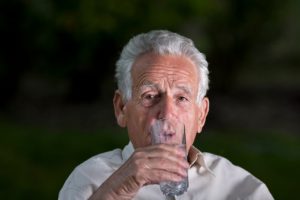 Research from the University of East Anglia suggests that routine blood work could better help determine dehydration in older adults. Older adults are at a higher risk of dehydration, which is a serious health condition. Dehydration can lead to poor health outcomes such as disability or even death.
Research from the University of East Anglia suggests that routine blood work could better help determine dehydration in older adults. Older adults are at a higher risk of dehydration, which is a serious health condition. Dehydration can lead to poor health outcomes such as disability or even death.
The current test for dehydration – serum osmolality test – is expensive and not widely available. The findings suggest that routine blood work, testing for sodium, potassium, urea and glucose, can be just as effective in determining dehydration.
Advertisement
The results of the blood work are put through an ‘osmolality equation’ so researchers can determine how dehydrated an individual is.
Dr. Lee Hooper, lead researcher, said, “Around 20 percent of older people living in residential care are dehydrated, and that figure rises to around 40 percent among those admitted to hospital. Older people often drink less than younger people for a variety of reasons. Loss of routine and fewer social contacts can reduce drinking. In some cases older people choose to drink less as getting to the toilet can be more difficult and take longer. It can be physically difficult to make, carry and drink a cup of tea when you get older – especially if you need a zimmer frame to walk about. And older people tend not to feel thirsty when they drink too little so their bodies don’t warn them to start drinking.”
As we get older, our kidneys also age and no longer function like they used to. Our bodies can’t preserve fluid as well, which means the regulation of balance is slowly reducing. When that happens, dehydration can occur, and unfortunately, it is often difficult to notice until the dehydration becomes more serious. For seniors, if a caregiver does not recognize the symptoms, it could lead to urinary tract infections (UTIs), disability, admission to the hospital or even death. Serum osmolality tests are often used to determine the concentration of a patient’s blood, which is affected by dehydration. Unfortunately, the test is expensive, which doesn’t make it a viable solution for everyone.
Dr. Hooper explained, “It is an expensive and time consuming procedure – and clinical laboratories would not be able to handle routine screening. Simpler tests such as urine measurements, which appear to work well in children and young adults, do not work in older adults. When our blood becomes more concentrated, as we become dehydrated, concentrations of serum sodium, potassium, urea and glucose rise. Many blood tests routinely measured in older people already check for all of these, and assess them independently. We wanted to test whether results from routine tests for sodium, potassium, urea and glucose could be used together to accurately screen for dehydration by using a simple mathematical equation.”
Due to the many equations and tests already being used, Dr. Hooper and the research team wanted to find the one equation that is most useful and accurate for all seniors.
Advertisement
The researchers studied 595 adults over the age of 65. These individuals were healthy and lived independently, or were frail and lived in residential care. Kidney function and diabetes were also taken into consideration.
They tested the accuracy of 39 different equations and compared them to results that were measured with serum osmolality. The equation described by Dr. Annu Khajuria and Dr. John Krahn had the greatest universal accuracy. Dr. Hooper concluded, “We propose that clinical laboratories use this equation to report on hydration status of older people when reporting blood test results that include sodium, potassium, urea and glucose. We hope our findings will lead to pragmatic screening in older people to allow early identification of dehydration. This would help doctors, nurses and carers support older people to increase their fluid intake.”
